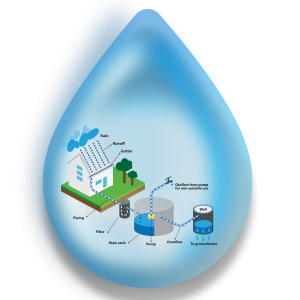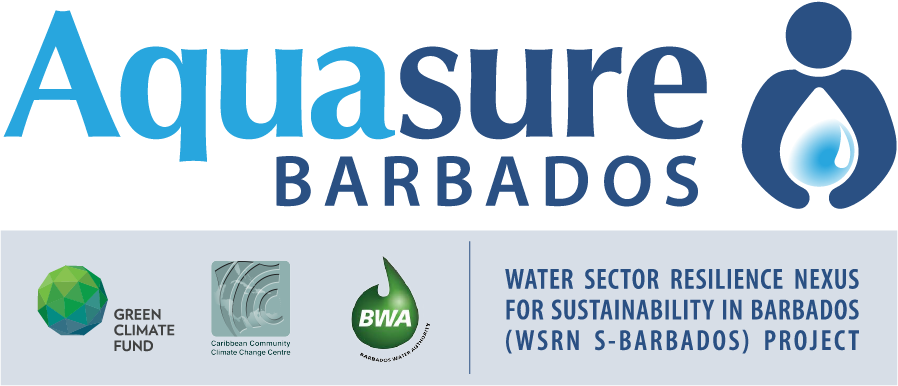
RAINWATER HARVESTING: IT’S RWH TIME
Rainwater harvesting is the key to future water conservation gains. Aquasure Barbados urges Barbadians to Start Rainwater Harvesting (RwH) Now! The project aims to implement a rainwater harvesting programme to engender a greater personal sense of responsibility for saving water.
WHAT IS RAINWATER HARVESTING?
Rainwater harvesting (RWH) is an ancient practice that is now globally accepted as a means of sustainable water management. It can be implemented by anyone on many different levels, from a simple rain barrel to large cinerns to supply your entire household non-potable water demand or a comprehensive system that integrates with an irrigation system or split household plumbing for toilet flushing, bathing or laundry.
In essence, rainwater harvesting is the collection of the run-off from a structure or other impervious surface to store it for later use. Traditionally, this involves harvesting the rain from a roof. The rain will collect in gutters that channel the water into downspouts and then into some sort of tank.
Rainwater harvesting is becoming a viable alternative for supplying farmers, businesses and households with non-potable water, thereby reducing demand for water from BWA mains. All that is necessary to take advantage of this resource is to capture the free water falling on your roof and direct it to a rainwater storage tank.
CREATING A COMPLETE RAINWATER HARVESTING SYSTEM
The image below shows a complete rainwater collection system. While some of the components shown are necessary, not all are required.
- It all starts with your roof surface. Nearly all roof surfaces are fine for rainwater harvesting.
- Your gutters should have some sort of gutter protection screening to keep large debris from entering the gutters.
- You can collect rainwater from any type and shape of a gutter. You do not need a special gutter for harvesting rainwater.
- An additional filtration opportunity is with the installation of a rain head (downspout filter) that allows for a few self-cleaning filtration options.
- A first-flush diverter helps to prevent the first flush of contaminated rainwater and foreign matter on the roof from entering the tank.
- Another rainwater filtration opportunity is with a tank screen that is installed on the tank entry point. It also helps to keep mosquitoes and pests out.
- Rainwater tanks come in all sorts of sizes and materials.
- Install an insect-proof flap valve on the end of the overflow pipe to keep mosquitoes and pests out.
- An auto-fill system can be installed to keep a minimum amount of water in the tank at all times. This is very important for rainwater tanks that are connected to automatic irrigation systems to prevent the pump from running dry.
- Select a pump system to provide pressurized rainwater to distribute the rainwater easier or to connect to an in-ground irrigation system.
- Install an irrigation filter inline after the pump to catch any large debris that may have gotten through the pump.
- A water level indicator can be helpful with monitoring the water usage from the tank.
USES OF COLLECTED RAINWATER
Collected rainwater can be used for many purposes, but in the case of Barbados, the legislation only permits it for non-potable uses:
- Watering lawns/gardens/farms
- Refilling fountains and ponds
- Washing your vehicles
- Flushing toilets
- Bathing your pets
- Washing clothes
BENEFITS OF RAINWATER HARVESTING
WATER CONSERVATION
The rainwater that falls on your roof and property is essentially free. All it takes is a method to harvest it into a tank or cistern for later use. Rainwater harvesting can also be a great educational tool to get people to recognize their individual or household water usage. This can get them to start conserving water in other areas around their home. Rainwater harvesting helps the BWA reduce peak demands during dry months, saving treated water for more important and appropriate water uses.
RAINWATER IS PLANT-FRIENDLY
Rainwater is an excellent source of water for plants and landscape irrigation.
RAINWATER REDUCES ENERGY USE
While the logical use of rainwater harvesting is for water conservation purposes, it also reduces energy use. Typically, the end-use of the rainwater is located on the property where the rainwater is collected. Replacing BWA-pumped water use with rainwater reduces the amount of water that the authority has to treat and then pump to your house. The treatment and pumping of the BWA-provided water require significant energy.
RAINWATER BENEFITS YOUR POCKET
Using rainwater for irrigation and other non-potable uses to replace the BWA-provided water reduces your water bill.
8ut it’s more than that. The costs to supply treated water as well as to maintain and replace infrastructure are significant. These costs are borne by every customer of the Barbados Water Authority. The practice of rainwater harvesting can reduce water demand and potentially allow the BWA to provide potable water service at a lower cost.
Designing and installing rainwater collection systems can also provide sustainable jobs for the economy.
